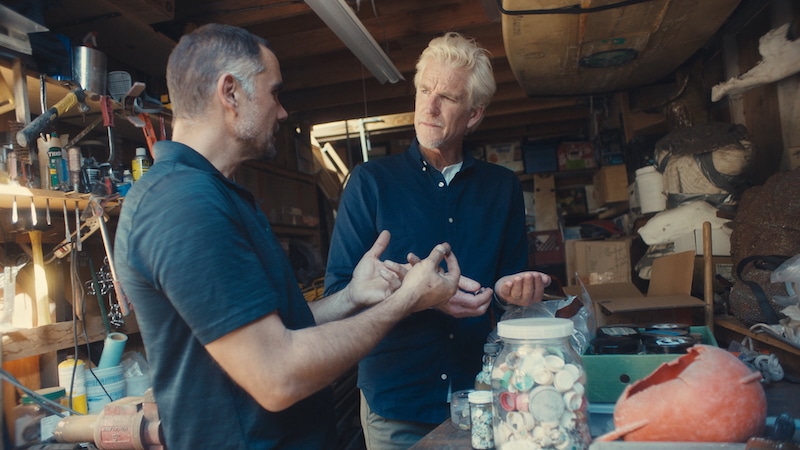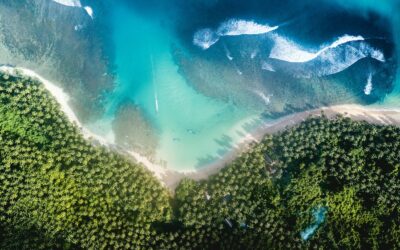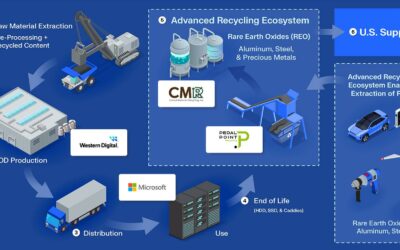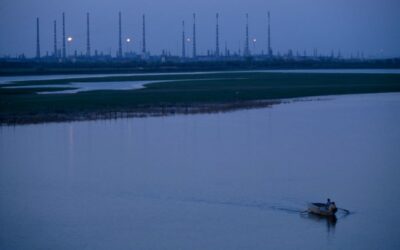This post was originally published on Eco Watch
Right now across the U.S., drought persists, particularly in the northeast, where wildfires are burning because of the dry conditions. At the same time, some communities are still recovering from the catastrophic effects of hurricane season and the wind and water mash-up they wrought. In either case, water – both as a source of life and catastrophe – is perhaps more in the minds of people than ever before.
The World Water Film Festival (WWFF), happening November 16 and 17 at the The Forum at Columbia University in New York City, offers ways to see water through a cinematic lens. “Films really allow you to make an emotional connection and see the impact that water has with people,” said Robert Strand, executive director of the non-profit festival.
Many of the films are documentaries that look at different communities and their local water issues. For example, Since the Spill documents the almost forgotten Mexican fishing communities that persist 14 years after the devastating Deepwater Horizon oil spill. Another short film, Muddy Waters, follows a group in Brazil who began to fish for garbage once their fish stock dramatically dwindled.
The WWFF will showcase not only documentaries, but also narrative drama and comedies, even some experimental work. In addition to a film slate of more than 40 selections, there will be a series of talks and panels, and an exhibition space.
“We’re allowing the different films and the different genres of films to take us to different people to inspire them to be water advocates,” said Strand.
Actor Matthew Modine is an executive producer on two films in the festival. Sludge tells the story of groundwater contaminated by PFAS across farms in Maine, and how the farmers, in particular Fred Stone and his wife of Stone Ridge Farms, fought back. And Ripple Effect, a short film narrated by and featuring Modine that aims to become a series, searches out “wavemakers” around the world who are trying to make change happen now. Because time is of the essence.
“There is greater urgency in the task at hand in less and less time,” Modine wrote via e-mail. “We know the damage we are doing, and we simply have to change our destructive behavior.”
Matthew Modine in a scene from Ripple Effect. Cinco Dedos Peliculas
Some of the footage from Ripple Effect takes place in California. Modine lived in San Diego for a while earlier in life, surfing at Imperial Beach.
“Imperial Beach borders Tijuana, and the Tijuana River would occasionally close my surfing spots after a heavy rainstorm because of river pollution,” he wrote. “Today, the San Diego beaches, especially Imperial Beach, are closed sometimes for more than a hundred days a year. This is because of raw sewage, and God knows what has been dumped and ended up in the river. That has to stop.
“Today, it is very common to see open sores on fish and cancer in seabirds and sea mammals, especially seals. It’s tragic.”
“PFAs are everywhere. Teflon is in the blood of everyone on the planet. Which means it’s probably in the blood of every animal,” Modine wrote. “Progress is being made to treat sewage, break down it, and remove PFAs from water. What’s the simplest and best way to prevent PFA’s? Prohibiting their manufacturing and stopping their use in consumer products. Why wouldn’t people be furious when they learn that PFAs are in things like dental floss? It’s like the manufacturing giants are actively trying to poison and kill people.”
And while Modine might be the best-known name at the festival, other filmmakers are telling equally urgent stories. Ewa Ewart is a Polish-born filmmaker currently living in the UK and working for the BBC. Her film, Until the Last Drop, explores rivers and the freshwater crisis around the world.
“Her film touches upon rivers and it shows the impact that communities can have if they rally around their water sources,” Strand said.
The main feature over the two days will be Our Blue World, a followup to the Netflix documentary Brave Blue World.
In a similar vein to Ripple Effect and Anne de Carbuccia’s Earth Protectors, the filmmakers travel the globe to seek out people exploring, studying and fighting for clean, fresh water. Liam Neeson narrates on the evolution of water over the billions of years of Earth’s history.
There is a dramatic film, Texas Mermaid, which led to the organization Aqua Mermaid participating in the festival in the hopes of getting young people to realize that clean water is essential.
“If I have a film and a little girl sees this story about her mermaids and it’s like, wait, what mermaids need clean water? And she’s inspired, then I will have done a good deed in this world,” Strand said.
While politics is not directly mentioned in the festival programming, Strand mentioned its impact on water issues.
“What inspires me is that there are grassroots community organizations all over this world that are stepping up to do something about some of these problems,” he said. “It is really inspiring to see what people will be capable of if we pull together and rally around a common cause. And that cause being water.”
“If one person begins to take steps to repair a situation, it creates a ripple effect,” wrote Modine. “If a hundred people follow suit, it creates a powerful wave of positive change.”
Strand noted a key lesson learned from producing the third water film festival, which is the second affiliated with Columbia. “I am fully aware that the dollar is the language of value in many societies,” he said. “Things need to be profitable, right?” he said. “And at the same time, water needs to be at the center of a lot of decision-making, and it’s not. And the connection I’m seeing through different films that have been explored, and just being a part of this now for a few years, when water is not centered to a decision-making process, people don’t realize the cost that can come, that can be averted if we can do simple things.”
For more information: https://worldwaterff.org/
The post World Water Film Festival Opens in New York, Aims to Inspire appeared first on EcoWatch.





0 Comments